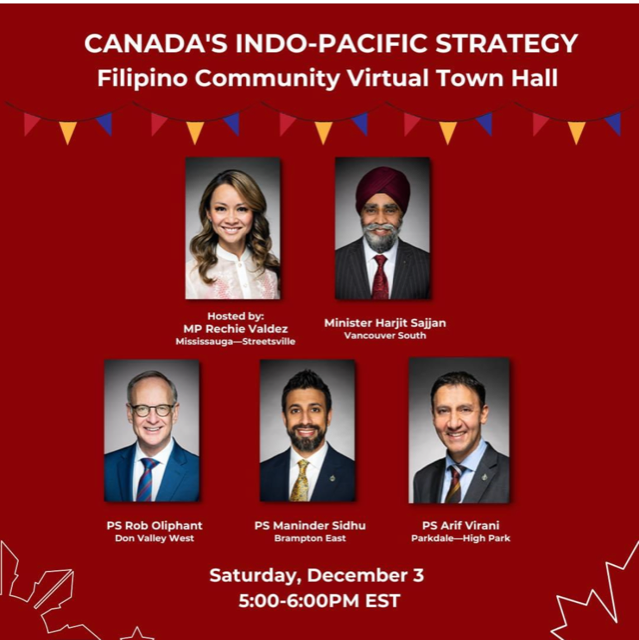
The virtual townhall meeting on Canada’s Indo-Pacific strategy, hosted by Mississauga Streetsville MP Rechie Valdez, drew mixed reactions after questions about human rights and Marcos Jr regime corruption were ignored during the online meeting on December 3.
The 68 invited participants submitted a variety of questions to MP Valdez, who was facilitating the discussion during the ostensible consultation with the Filipino community on Canada’s role in the Indo-Pacific region. However, the discussion focused primarily on trade and investment, with few general responses to migrants’ concerns about family reunification.
Participants at the virtual townhall meeting were surprised that no questions or comments were chosen or provided during the panel discussion about Canada’s assistance to ASEAN countries, including the Philippines, where the military and police commit rampant human rights violations.
The omission raises the question of how, if at all, Canada’s Indo-Pacific strategy views the human rights situation in the Philippines, where rights defenders and civilians are being attacked, redtagged, and killed for exercising their rights to free expression and legitimate dissent.
It should be noted that former President Duterte cancelled a $233 million agreement with Canada to purchase 16 helicopters, citing concerns that they would be used to fight rebels and bomb civilian communities, potentially worsening human rights violations. This was raised as a concern during the virtual meeting, but it was addressed by stating that Canada follows international standards for military training that is only used for peace and security.
Even though the human rights question was not selected during the panel discussion, the panelists stated that the Canadian government adheres to human rights standards when addressing human rights issues. Some participants, however, believe that critical discussion on Indo-Pacific strategy was omitted on purpose because the government desires public support. Other participant questions that were not selected concerned Philippine corruption practices that could divert Canadian aid to corrupt politicians.
But near the end of the one-hour virtual meeting, MP Arif Virani, a Canadian lawyer and politician who has been the MP for Parkdale—High Park since 2015, said that he was worried that important questions had not been discussed or thought about.
The Canadian government recently unveiled an Indo-Pacific strategy that includes a $2.3 billion investment plan over the next five years. As the world’s generational shift occurs, it is hoped that Canada will take an active role in the region, working with allies and partners to shape the region’s future. The Indo-Pacific strategy reflects the Canadian government’s commitment to democracy, the rule of law, economic growth and resilience, peace and security, sustainable development, human rights, gender equality, and concrete environmental action.
The panelists’ safe responses and cold treatment on human rights issues in the Philippines have provided a glimpse of what the Indo-Pacific strategy may result in in the coming weeks and months since its launch in late November of this year.
